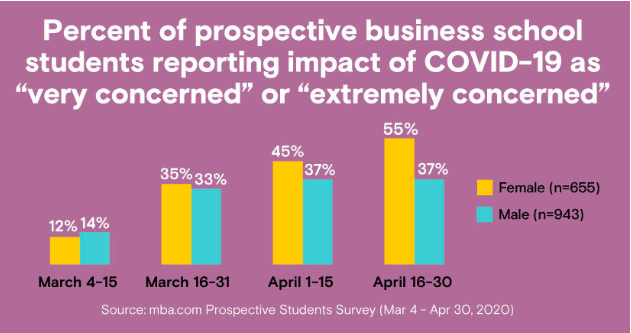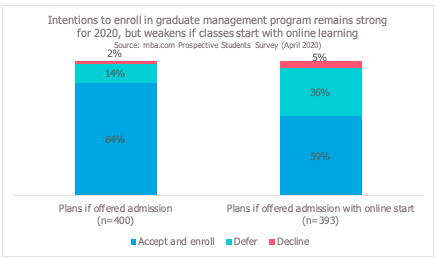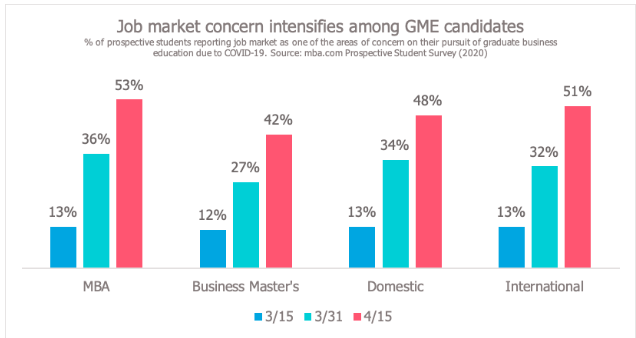
Like most other institutions, business schools have felt the impact of the COVID-19 crisis. With campuses forced to close, restrictions on travel, and economic hardships, it has become increasingly challenging for Business Schools Student Recruitment.
At the same time, there are some reasons to be optimistic about the future. By thinking long-term, offering more opportunities for online learning, and being flexible, you can position your business school to weather the storm and maybe even come out of this situation stronger through various student recruitment strategies for business schools.
Keep reading to learn more about how COVID-19 has affected student recruitment for business schools and how to navigate this difficult period.

How Has COVID-19 Impacted the Study Plans of Business School Candidates?
The pandemic has had a massive impact on students’ study goals across the education sector, with many reconsidering their plans. For business schools, however, there is some evidence that the situation isn’t quite as bleak as it might be in other areas.
The Graduate Management Admission Council (GMAC) has diligently tracked the reactions of potential business school candidates as the crisis unfolded, and some of the results have been encouraging. An April survey found that only 5 percent of respondents intended to abandon the idea of attending business school altogether, suggesting that the pandemic hasn’t made business school a less attractive proposition overall.
However, while candidates’ aspirations have not changed, so have their plans. Twenty-nine percent of respondents considered delaying their studies, while 46 percent considered other alternatives.
GMAC has also consistently found that COVID-19 has become more and more of a potential problem for prospective business school students as the pandemic has persisted.
In another survey, respondents reported increasing levels of concern that COVID-19 would impact their study plans as the weeks went on and the situation worsened.
Interestingly, this upward trend was sharper among female candidates than males, although men reported slightly higher levels of concern in the early weeks of the outbreak:

This points to a challenging – but not impossible – situation for business school student recruitment. The candidates’ desires remain, but some issues must be addressed to convince them to move forward.
The Effect of the Pandemic on International Business School Student Recruitment
The challenges of the pandemic are perhaps even greater when it comes to international student recruitment for business schools.
In a February survey by QS, 27 percent of prospective international students across the university level said the coronavirus had impacted their plans to study abroad, with 37 percent saying they planned to defer their studies.
Another GMAC survey echoes the crisis’s more significant impact on international audiences within the business school sector. MBA and business master’s students are far more likely than domestic candidates to defer their studies should programs in the fall begin online rather than on campus.

This speaks to a wider problem of how much those interested in international study will value an online MBA or Master’s degree if it doesn’t promise the opportunity to live and possibly work in a new country.
How Does This Affect MBA Students?
Speaking to Reuters, a Chinese student who was considering deferring a program at Wharton Business School said, “The virtual environment might take away a chunk of the MBA experience.”
Opportunities to establish themselves professionally, build a network, and experience a new environment are important to business school candidates and may be tough to replicate.
A crucial caveat is that the attitudes of international recruitment prospects might differ based on where they are from and their study destination. QS’s survey found that 33 percent of international students were now looking at studying in different countries than before.
GMAC’s research into candidate responses by region bears this out, with 47 percent of Central and South Asian respondents, 40 percent of East & Southeast Asians, and 30 percent of Middle East & Africa candidates stating they were considering studying in another geographic area.
This suggests that international study preferences will shift towards countries less affected by the outbreak or those that recover and reopen faster.
Here is An Example:
GISMA Business School in Hanover offers prospective international students the opportunity to begin their courses online before finishing them on campus once travel restrictions are lifted.
Given Germany’s more successful flattening of the curve than many other major countries, it may have better chances of reopening sooner rather than later. Thus, its popularity as a study destination could dramatically increase in the coming months.

The GMAC report may also hold some interesting insights into what is holding prospects from certain countries back. For example, 34 percent of candidates in Central & South Asia and 33 percent of Middle Eastern and African respondents expressed concern about their ability to secure visas, suggesting logistical fears may be a bigger factor than an unwillingness to travel for some.
These numbers were much lower in East and Southeast Asia (13 percent), Europe (5 percent), and the USA (3 percent).
Naturally, this situation will probably improve over the next few months as measures are scaled back.
Still, those schools looking to recruit students for next semester may better target domestic candidates, who might be more receptive to remote learning.
Example: A persona for a domestic business school candidate. Focusing on this audience could be particularly valuable for schools right now.

It’s important not to discount trying to recruit international students entirely. Business school recruitment is often a long game and given how different things could be by this time next year, keeping your school at the top of your mind for international prospects could be essential to your future success.
Mitigating the Barriers to Online Business School Education
While online business school education has long been a thriving concern, most business school candidates strongly prefer campus-based learning.
As a result, many are reluctant to consider online alternatives, even as a temporary measure. GMAC figures indicate that roughly one in three current candidates would prefer to defer if admitted to a program that would start online next semester:

This suggests that your business school must work hard to convince prospects of the worth of completing a degree online.
Updating your website to showcase your LMS better could go some way to reassuring prospects that your programs represent a worthwhile investment.
If you have run online courses in the past, sharing testimonials from online graduates, particularly those who have gone on to success in their careers, could be invaluable in persuading those who are still deciding.
Example: Feliciano Business School created this testimonial video from a student in its online MBA program. Social proof like this could be important in convincing prospects to take a chance on remote learning.

Speaking to the Needs and Goals of Business School Candidates During COVID-19
While the situation may have drastically changed for business schools, the fundamentals of business school recruitment remain the same.
Developing accurate personas of your ideal candidates, promoting your programs across multiple online channels, and being persistent in your lead qualification and nurturing are all essential to help your business school weather this storm.
However, you can do several specific things to help mitigate some of the more unique barriers to enrollment for business school candidates due to COVID-19.
Creating Virtual Networking Opportunities
One of the biggest reasons many prospects are skeptical about learning online is the importance of building a professional network to the business school experience.
Prospects expect to meet and connect with like-minded professionals and will even be hopeful that companies will seek them out for high-profile jobs during their degrees.
Speaking to Reuters, a Chinese student who had been admitted to Columbia Business School said, “The most important part of the MBA is recruiting, and even that is going to be virtual. I don’t need people to teach me basic accounting. I already know all that.”
However, some schools are trying to turn this negative into a positive. In the same article, Sanjeev Khagram, the Dean of The Thunderbird School of Global Management at Arizona State University, emphasized how his school encouraged students to treat this as an opportunity to adapt to business in a virtual world.
This aspect of their education will become increasingly prevalent regardless of social restrictions. “Being effective in this virtual world gives them a competitive advantage,” he said of his incoming class.
With that in mind, there are many ways you could formulate an online experience for business school students that will help them to make the connections they crave. You could, for instance, host virtual networking events or even invite employers to virtual recruitment fairs.
Example: London Business School created this virtual networking event for prospective students to meet with alumni from the Middle East.

Addressing Post-COVID-19 Career Concerns
Concerns about networking and recruitment opportunities also hint at more prominent misgivings business school candidates may have about the potential value of their degree in a post-COVID-19 job market.
With many businesses forced to temporarily or permanently close and others suffering massive income losses, the pandemic’s damage to the economy has been catastrophic and may take years to recover.
As a result, it’s natural that some of your prospects may worry that a master’s or MBA degree, which is not cheap at the best of times, may not provide them the return on investment they had previously hoped.
GMAC data shows that job market concerns have intensified as the crisis has progressed among both domestic and international candidates considering MBA and master’s degrees:

Again, however, it is possible to turn this minus into a plus. Historically, a respected MBA or business master’s degree has insulated many professionals against economic downturns, with the versatility and range of skills the qualification offers to keep them employable in both good times and bad.
Emphasizing this in your marketing efforts could make them see a business school education as a solution.
Example: This well-timed blog from Berkeley Haas School of Business outlines how an MBA can help you during economic uncertainty.

Not only that, but with the economy likely to at least somewhat rebound throughout the next couple of years, choosing to pursue a degree now could leave candidates in a very good position when opportunities begin to open up again.
Meeting Admissions Requirements Online
Another concern you may not be considering is the difficulty some people will have in meeting requirements for business school admissions during the current crisis.
When applying for top business schools, many candidates will be looking to sit the GMAT, GRE, or Executive Assessment tests to meet admissions criteria. At the same time, international applicants may also need to take courses or sit exams to meet language requirements. Their plans for completing these exams may have been disrupted during the pandemic.
Fortunately, both the GMAT and GRE can now be completed online, as are some of the widely recognized language tests, and you might be well-served to ensure interested applicants are aware of this.
Providing resources to help students prepare for these exams might also be an idea.
Forbes reported recently that some test takers have found the transition to taking the GMAT online difficult, particularly the paperless note-taking aspect of the new format (a measure deemed necessary to keep the test secure).
Creating blogs or online information sessions to help students prepare for this exam—and ensure they know what to expect—could help some of your prospects navigate this challenge while also providing valuable content they will appreciate.
Here is An Example
Your school could share articles like this through your social media accounts or create your own.

Some will also carefully consider how well their resume stacks up against other applicants, which may be problematic. For instance, some candidates for executive or professional programs may have recently been laid off due to circumstances beyond their control and may be worried that they are no longer as attractive an applicant.
Reassuring them that they will be judged on their career, not just their current situation, could encourage them to apply.
Like all areas of the education sector right now, business schools face severe hurdles in meeting their enrollment targets. But with some inventiveness and hard work, it’s more than possible to continue attracting quality applications for your programs.

FAQ To Consider
How do I recruit MBA students?
GISMA Business School in Hanover offers prospective international students the opportunity to begin their courses online before finishing them on campus once travel restrictions are lifted.














